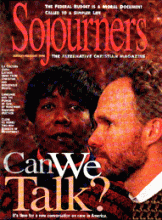On October 16, 1995, more than a million black men, young and younger, old and older and the stages between; prosperous, accomplished, striving, and struggling; representing every denomination of the religious spectrum and every possible phase of African-American male experience, including some recently released from jail, converged upon the Mall in Washington, D.C. Vincent Harding speaks truth when he refers to the Million Man March phenomenon as the "manifestation of a hungering and thirsting after righteousness" and quotes the electronic testimony of a marcher, "The Spirit Lives!"
Indeed, the power that has defied every attempt to reduce it to language is profoundly spiritual. Those who were present try to describe it and those who watched on television understand because it was visible and audible and tangible even through the television screen. What was it? The power was transcendent-profoundly greater than any single participant or leader or spokesman. It was imminent-as wholesome and intimate as the hug of brother and brother and father and son.
What drew so many black men from so many places to this sacred pilgrimage? The call to march touched a deep-seated yearning within African America.
For more than three centuries, black men have been vilified and demonized in this country. The breaking-in process after the horrific Middle Passage intended to destroy the identity of those men and women from Africa. They were stripped of name, language, family, and the practice of their faith.
The process has continued in the latter 20th century. The predominant media image of black manhood has been either criminal or foolish. The repeated recitation of negative data would have the world believe that African-American men are in jail, on drugs, selling drugs, and intentionally irresponsible. To be sure, there are too many who fit the popular description. But they are not the majority of black men.
Read the Full Article

